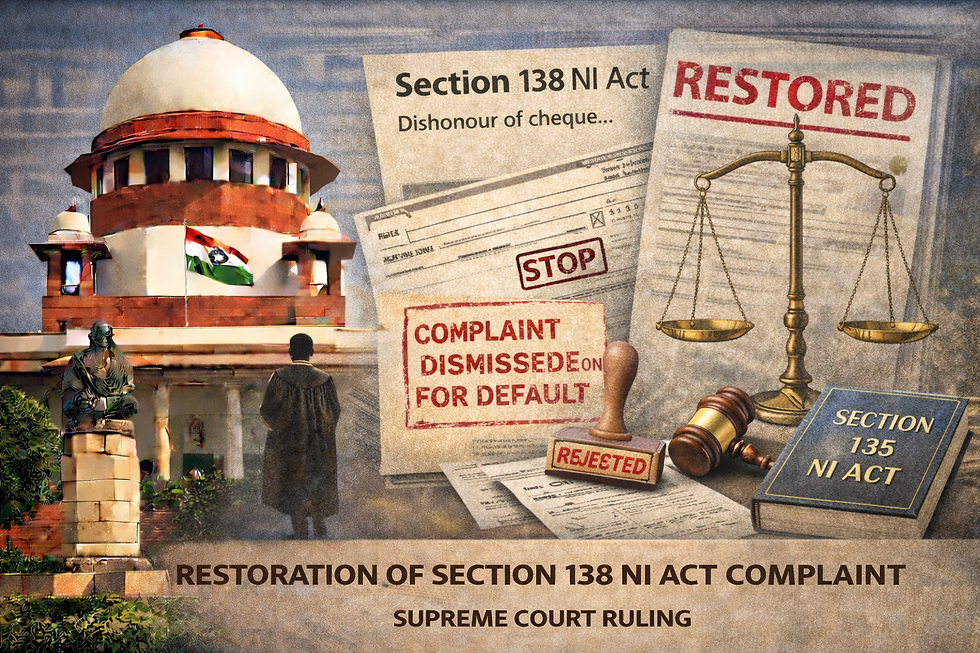Supreme Court Clarifies Judicial Review Scope in Government Contract Disputes: Insights from Katra vs. Kumar Case
- Chintan Shah

- May 10, 2024
- 3 min read
Summary of the Judgement:
Case Name: Municipal Committee Katra & Ors. v. Ashwani Kumar
Date: 09 May 2024
Judges: Honorable Justice B.R. Gavai, Honorable Justice Sandeep Mehta
Advocates: For Appellants: Shri Pashupathi Nath Razdan For Respondent: Mr. Rakesh K. Khanna
Acts and Sections: Invoked under the general jurisdiction of the Supreme Court, addressing issues related to contractual obligations and public administration.
Cited Judgments: Union of India v. Maj. Gen. Madan Lal Yadav (1996) 4 SCC 127; Union of India and Ors. v. Puna Hinda (2021) 10 SCC 690
Introduction:
The recent Supreme Court judgment in Municipal Committee Katra & Ors. v. Ashwani Kumar illuminates the contentious interplay between contractual obligations and the writ jurisdiction of high courts. The judgment provides a crucial precedent for understanding the limitations of exercising writ jurisdiction in disputes arising from contractual relationships.
The Factual Matrix:
The dispute emerged from a contract awarded by the Municipal Committee, Katra, for the transportation of pilgrims. The respondent, Ashwani Kumar, was awarded the contract after the original highest bidder failed to execute it. The contention revolved around Clause 8 of the Notice Inviting Tender (NIT), which required the successful bidder to deposit 40% of the bid amount and provide security through post-dated cheques and a bank guarantee.
The respondent sought relaxation from these conditions, which was denied. This led to multiple legal actions, culminating in the present appeal before the Supreme Court.
Legal Analysis:
The core issue was whether the High Court justified exercising its writ jurisdiction to address a dispute arising from contractual engagements. The judgment emphasized that contractual disputes, particularly those involving detailed factual determinations like quantifying damages, are generally outside the purview of writ jurisdiction. This is consistent with established legal principles, where the courts have held that matters arising purely out of contractual rights should be adjudicated in civil courts or through agreed-upon contractual mechanisms like arbitration.
"No one can be permitted to take undue and unfair advantage of his own wrong to gain favourable interpretation of law," the Court remarked, highlighting the doctrine of 'nullus commodum capere potest de injuria sua propria'—no man can benefit from his own wrong. This principle underscores the judicial approach towards ensuring fairness and preventing unjust enrichment, irrespective of the technical positions adopted by the parties.
Critical Observations:
The judgment is noteworthy for its elucidation on the limitation of writ courts in intervening in contractual matters. The Honorable Justices B.R. Gavai and Sandeep Mehta reiterated that:
The High Court should not venture into areas where detailed factual analysis and interpretation of contract terms are required.
The principle of unjust enrichment cannot be used to bypass the contractual terms and conditions to which the parties have agreed.
The judgment also deals with the practical implications of the parties' actions on their legal rights. The respondent's failure to adhere to the stipulated terms resulted in a delay in the commencement of the contract, leading to financial losses. However, his attempt to seek redress through writ jurisdiction was deemed inappropriate due to the nature of the dispute.
Conclusion:
The Municipal Committee Katra case serves as a critical reminder of the boundaries of judicial intervention in contractual disputes. It reaffirms the need to respect the autonomy of the contractual framework while ensuring that parties do not exploit the judicial process to escape the consequences of their actions.
This judgment will significantly influence future cases where parties attempt to invoke writ jurisdiction in contractual matters, guiding legal professionals in structuring their arguments and understanding the courts' likely stance.



Comments